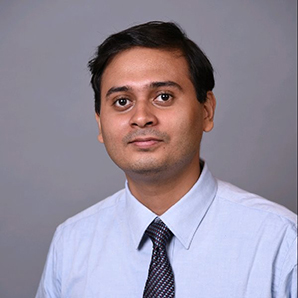Why did you choose graduate school at IUPUI?
Upon completing a bachelor’s degree in Microbiology and a master’s degree in Biochemistry, I developed an appreciation towards the many fascinating theories of the sciences, particularly the intricacies of the metabolism-associated diseases. To satisfy my curiosity, I started to learn more about the disease biology by working in an academic laboratory focused on non-alcoholic fatty liver disease (NAFLD) in India. I realized the vast potential in this field, considering there are no FDA approved therapies to date and that it has a significant amount of healthcare resource utilization around the world. I was thus motivated to pursue research in this domain and set sights on becoming a biomedical research scientist.
While navigating my applications to graduate schools in the United States, I came across the Indiana Biomedical Gateway (IBMG) program at Indiana University School of Medicine. My interactions with the Graduate Program Directors - Tara Hobson and Brandy Wood - allowed me to easily explore what the school had to offer, although I was on a different continent.
The opportunity to rotate and engage with leading professors across different departments made me realize that this school fosters an environment of continuous learning and support. I found pioneers in the field of metabolism associated diseases and came across the Center for Diabetes and Metabolic Diseases (CDMD), which is one of the 18 NIH-designated research centers in the United States. I indicated my interests to rotate with and have the possibility of joining the labs among three such mentors at Indiana University School of Medicine. Thereafter, I joined the laboratory of Dr. Xiaocheng Charlie Dong, a renowned figure in the field of metabolism and liver diseases.
What has been your favorite academic accomplishment since you’ve been here?
As a budding biomedical scientist in the Department of Biochemistry and Molecular Biology, I could utilize the supporting network of the amazing faculty members, lab members and my mentor to develop my scientific knowledge and frame research questions keeping in mind the responsible conduct of research. I have been fortunate to be a part of this collaborative environment that has allowed me to publish seven peer-reviewed articles in leading international journals.
Moreover, the support and honor that I have received from Indiana University in terms of being awarded the IUPUI Travel Fellowship Award and the IUSM Graduate Student Travel Grant to present my research at the Experimental Biology Conference in Philadelphia, April 2022 has been a humbling experience.
I am also indebted to the judges of the 7th Annual Diabetes Symposium, organized by the Center for Diabetes and Metabolic Diseases for awarding me with the Graduate Student Excellence in Research Award in 2021.
What do you enjoy most about life in Indianapolis?
I appreciate the simple, yet vibrant life that Indianapolis has to offer. Having one of the lowest costs of living in the United States, Indianapolis provides graduate students a good opportunity to begin their financially independent lives. Being at the “Crossroads of America,” Indianapolis is located perfectly for driving to destinations in and around the state like Chicago, the Smokey Mountains or exploring the natural beauty of Michigan. I have also been a fan of the Indy 500 which is one of the Triple Crowns of Motorsports. One of the highlights of my time here was to travel to South Bend to watch my favorite team Liverpool F.C. play against Borussia Dortmund at the University of Notre Dame Stadium!
Moreover, I have made the best of friends and lifelong connections here in this city during my graduate school life that I will cherish for years to come.
Please provide some details about your work/research as a graduate student and/or any activities you are involved in.
As a first generation student in my family to pursue a Ph.D from the United States, I feel a great sense of responsibility and purpose to drive my research goals. I am currently conducting research at the forefront of liver biology in the context of Non-alcoholic fatty liver disease (NAFLD) and hepatic fibrosis. Hepatic fibrosis is a repair mechanism that is initiated upon tissue injury, mediated primarily by hepatic stellate cells (HSCs). Activated HSCs deposit excessive extracellular matrix (ECM) components such as collagen in a highly dynamic process. Although progress has been made in understanding the pathobiology of fibrosis, there remains a translational void in the development of antifibrotic therapies to prevent the progress to end-stage liver diseases. My project comes in to address and identify potential druggable targets that regulate the progression of fibrogenesis and prevent the advancement to terminal stages. Through my independent efforts, I identified Sirtuin 6 as a key molecule that regulates fibrogenesis by modulating the Hippo signaling cascade and gained hands-on experience on diverse techniques like small animal surgery, biochemical assays like immunoprecipitation and immunoblotting and molecular biology techniques like cloning, RNA isolation and quantitative PCRs.
Outside the lab, I have served as a representative of the School of Medicine in the Academic Affairs sub-committee of the Graduate and Professional Student Government (GPSG). Also, I was one of the founding members of the Biomedical Graduate Student Advocacy Association (BGSAA). One of the highlighting aspects was a collaboration with a student organization in Germany to host a mental-health webinar during the height of the COVID-19 pandemic for the distressed students in need. I am indebted to the Counseling and Psychological Services (CAPS) professionals on campus to have been a part of this initiative and delivered a webinar called “The 8-dimensions of Wellness.”


